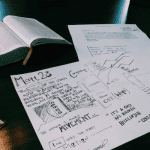 What do you do when you don’t like the Bible?
What do you do when you don’t like the Bible?
Recently, The Resurgence posted some tips by Ryan Kearns about how handle biblical passages that make you feel uncomfortable:
Rejoice that you are reading the Bible rightly.
- Study and try to understand the context of what you are reading.
- Observe your culture and lives and realize that they are not normal.
- Ask in community, seeking conviction in your own heart for parts of your life that must change to conform to Christ.
- Pray, asking God to change your heart and desires.
Is this the first time I have agreed with The Resurgence blog? There are lots of passages I don’t like in the Bible! Will these tips help me?
As an experiment, I decided to try out these tips on a passage that I find notoriously difficult: Matthew 22:34-40.
A lawyer among the Pharisees asks Jesus a question to stump him, “Teacher, which commandment in the law is the greatest?” This is already dangerous territory. Who is this Jesus to rank the commandments?
But that’s not the problem. I’m cool with Jesus. Jesus all day long.
Jesus answers, “’You shall love the Lord your God with all your heart, and with all your soul, and with all your mind.’ This is the greatest and first commandment. And a second is like it: ‘You shall love your neighbor as yourself.’”
Has there ever been a more difficult calling? Have I ever successfully obeyed this commandment? Who loves God and neighbor fully?
But still, this is not the part I find to be uncomfortable. Here it comes:
“On these two commandments hang all the law and the prophets.”
This is huge. This is difficult. This makes me very uncomfortable. This means that if I run into a law that isn’t loving, a law that doesn’t help me to love God and neighbor, I have to find a way to reconcile it to love. And that in the end, it has to hang on love. There are plenty of laws in my life that I will have to break if I want to be loving to God and neighbor. I don’t like that. So let’s ask The Resurgence, “What do I do when I don’t like the Bible?” and see what happens.
1. Rejoice that you are reading the Bible rightly.
So, the Bible is forcing me to rethink laws that are unloving. That’s a good thing. Hooray! Step one: accomplished.
2. Study and try to understand the context of what you are reading.
Yes. But my studies do not relieve my troubles. Frederick Dale Bruner writes, “Jesus’ answer to this Third Question gives the Christian Church nothing less than the gift of Jesus’ own hermeneutic, Jesus’ rule of biblical interpretation. Jesus in effect counsels disciples in this paragraph to read [the scriptures] with their ‘Jesus glasses’ on, that is, to read [the scriptures] through the double lens of Jesus’ commanded double love…Where strong Scripture texts can be marshaled on both sides of strongly held views in the church, the love command can prove decisive as a kind of tie breaker.”
Bruner agrees here. When following a particularly ruthless law, Jesus commands me to interpret that law through the lens of love. How inconvenient. Laws are helpful and logical and perfect. Laws help me to know right from wrong and how to order things in my life. I need laws. We all need laws. But Jesus says that laws have to be interpreted by love.
Wouldn’t it be easier to interpret love through laws?
3. Observe your culture and lives and realize that they are not normal.
Very true. Love is not the norm. Rigorous immorality and rigorous moralism are the norm. Convenience is the norm. Isolationism is the norm. Consumerism is the norm. Liberalism/Conservatism is the norm. I abide by laws that benefit me in all of these categories. If what is legal is not necessarily what is loving, then Jesus, what do I have to do?
4. Ask in community, seeking conviction in your own heart for parts of your life that must change to conform to Christ.
This is the tricky one. There are many kinds of communities I could ask, depending upon what answers I want. If I want to feel good about my isolationism, my consumerism, my liberalism/conservatism, I can find the community that reads my Bible the way I want to read it.
I can pick the right audience and say, “Look at this, you guys. Should we all do things differently?” And they say, “No! No way! There’s no way Jesus/Moses/Jonah/John/Paul meant that! We have been interpreting it correctly all along. Don’t worry about it.” And I feel better.
But most of the time, the community that asks me to give up the most, to stretch the farthest, or to look inward and examine my heart in the most honest ways is the one that I should consult on a given question of law and love. I say, “Should we all do things differently?” And they answer, “Wow, maybe,” or “I’ll join you in that choice. Let’s see what happens,” or “That sounds just like Jesus.”
And the community that stretches me may change depending upon the issue, which is why it is so important to cultivate diverse circles around me.
5. Pray, asking God to change your heart and desires.
God, help me to choose love and to hang all the laws on love. Help me to choose to love you and my neighbor over all other laws.
Bruner also says, “Jesus’ love rule must not be allowed to wipe out biblical texts that one doesn’t like.” But I would say to Bruner, don’t you see that this is The Text not to like? This one says that all the other laws hang on love and that robs us of our chances to be petty, exclusive, mean, haughty, separate, indignant, or self-righteous in our attempts to be right with the law. If I have to decide between a law and love, I have to choose love and love is always the harder choice. It may be a freeing choice, it may be a life-giving choice, and we may train ourselves to make it without even feeling the pain, but it will always be the choice that grows us, stretches us, empties our bank accounts, fills up the empty beds in our homes, uses us up and leaves us tired.
Tired but centered, with those Jesus glasses on.
—












